Ezekiel was both a prophet and a priest, and though his book is part of the Major Prophets, no other part of scripture refers to him by name. He is most known for his vision of God, but there is a lot of other important material as well, including end-times events and the Millennial Kingdom. Unlike other prophetic books, this one seems to be largely chronological and includes frequent date markers, a chart of which appears in Constable’s Notes under Structure. God refers to Ezekiel as son of man
(human), and Ezekiel refers to God as Adonai YHWH
(Lord of Lords).
The book begins with a vision of God’s glory, which Ezekiel describes as best he can. As a strange, flashing storm approaches, he sees what appear to be four living beings whose characteristics you can see in verse 5 and forward. The four beings are very much like what John describes in Rev. 4:6-8, and they’re described as the class of angels known as cherubim (see 10:15,20).
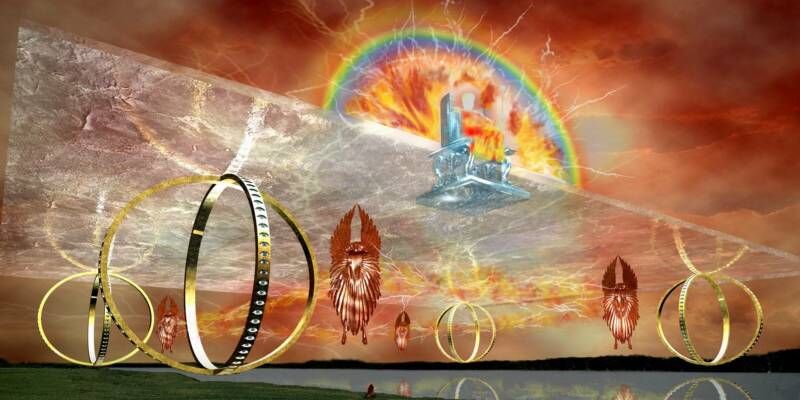
The text describes something in verse 13 we might interpret today as a kind of plasma energy source, which seemed to give the cherubim the ability to move at very high speed. But in addition to the cherubim there was a gleaming wheel beside each one, though it isn’t clear whether the wheels were concentric like a target, or at right angles like a gyroscope. They all had spokes, and the rims were covered with eyes, but it isn’t clear whether it’s the beings or the wheels that didn’t turn. Verse 20 says that the wind/spirit was in the wheels, but we can only guess what that means.
Then in verse 22 the focus turns to the sparkling platform over the cherubim’s heads. Whenever they moved, they stretched out their wings, which made a loud sound like the noise of battle or rushing water, and as the Hebrew text adds, like the voice of God. When they stood still, they lowered their wings and a voice was heard from over the platform. On the platform was a throne that appeared to be made of sapphire, and the one sitting on it was a human-like form with an amber glow from the waist up, and something like fire from the waist down. All around was a bright light resembling a rainbow, and the whole scene caused Ezekiel to drop face-down on the ground. This again is similar to John’s description of the throne in heaven in Rev. 4:2-6.
As noted in the introduction, the phrase son of man
, which appears almost a hundred times in this book, simply means of the human class of beings
, especially in contrast to supernatural beings. Jesus used this same term for himself many times in the Gospels. The only times Jesus referred to himself as son of God
, meaning of the God class of beings
(which only has one member!), was in John 3:18, 5:25, and 10:36, and indirectly in Luke 22:70. Both terms are true of Jesus.
So in ch. 2 Ezekiel is given his commission to prophesy to the nation of Israel, as well as to others who also have rebelled against God. His concern is not to care about the reaction but to just obey God’s commission. Now in verses 9-10 he’s given a scroll to eat, just as John would be given in Rev. 10:9-10. But while we aren’t told the content of John’s scroll, he was told immediately afterwards to prophesy to many nations. So there is a clear connection to this passage, and here we’re told that the scroll is filled with only bad news and laments.
We see here that this particular message is for exiled Israel, his own people. They’re repeatedly called stubborn and hard-hearted, which should remind us that the chosen people weren’t chosed because of their fine qualities, as we saw also in Deut. 7:7-8. So God makes Ezekiel as firm and unmoving as Israel is.
Then in 3:12 we see another supernatural act, where the cherubim carry Ezekiel to what sounds like Tel Aviv but has no connection to the modern city in Israel. There he sits in silence for a week, much the way Job’s friends had, and for the same reason: because of the spiritual and physical condition of the people. Then God reminds him to give his messages fearlessly, as a faithful watchman. Such a person must sound warnings, and there are dire consequences if they don’t. This same mandate is put upon anyone in the Christian community who has been given the gift of watching over it; they are not to only comfort people but also to warn them against spiritual danger. There is certainly going to be an accounting for failure to do so, as stated in Heb. 13:17.
In verse 22 God tells Ezekiel to move to another location, where he sees God’s glory. Then God uses him as an object lesson to the exiles: He is to lock himself in his house, where he will be unable to speak until God gives him a specific message.
In ch. 4 he’s to build a model of a seige as a sign for Israel. Then he has to lie on his left side for the number of days corresponding to the years Israel must bear its sin: 390. The life of a prophet of God is no picnic! After this, he has to lie on his right side for the days corresponding to the years assigned to Judah: 40. During this demonstration, he is to eat and drink specific things at specific times, but he has to cook the food over human excrement, to show that the people are defiled by eating the food of foreign nations while they’re in exile. But the human excrement is too much for Ezekiel to bear, so God allows him to use cow dung instead.
Then he has to shave himself with a sword, burn a third of the hair, slash another third with the sword as he walks around the city, and let the rest be scattered by the wind. All of this weirdness was to drive home the point to the people of Jerusalem that they had become more evil than the nations around them. So God would judge them, to the point where people would be so starved that they’d eat each other, and God would show them no pity. They would serve as an example to other nations of what happens to a wicked society.
In ch. 6 Ezekiel is to give a prophecy against the mountains of Israel, where the people had built shrines and altars to their false gods. The few survivors would serve as witnesses for coming generations against their nation, in the hope that they’d learn the lesson and turn back to the one true God.
Notice in ch. 7 the phrase the four corners of the land
(or earth
). No one has ever seen corners on the far reaches of earth, and it seems to always refer to the surface where people live rather than the earth’s foundations or pillars. Most take it to mean the four cardinal directions, in a figure of speech meaning the whole inhabited world. Yet this context specifically refers to the land or earth of Israel, so we can take it to mean that not an inch of it would be spared, because the people were getting what they deserved.
After descriptions of the horror to come, verse 19 says that their most prized valuables would be thrown in the street because there would be no food or water to buy. They had amassed wealth while divesting themselves of decency and faithfulness, and now that wealth would become useless. The temple itself would be desecrated as well. We see some of the fulfillment of this in Dan. 5:3-4, but also when Antiochus Epiphanes defiled it too, which you can read more about here.
Now we see another vision Ezekiel was given, by the figure of God similar to the first one. He is transported to Jerusalem, and the layout of the temple is shown in Constable’s Notes. The statue that provokes jealousy
was an idol, and this is one of the reasons we know that the future Antichrist will desecrate the Tribulation temple in the same way. But God says in verse 6, you ain’t seen nothing yet!
Next he’s told to go through a hidden doorway to a place where the elders of Israel were committing vile acts of worship. People today think they can secretly practice evil, but nothing is hidden from God, and he’ll wait until they feel overconfident to judge them. Still, Ezekiel hasn’t seen how bad it’s been. So he’s taken to another location to see what the women were doing as well: weeping for the false god Tammuz, who was both the brother and husband of Ishtar. Yet one more abomination remained to be seen, that being men worshiping the sun. They were all without excuse and deserved what was coming upon them.
In ch. 9 God turns Ezekiel’s attention to the forces that would bring Jerusalem’s ruin. But he sees what appear to be angels of God, and one of them is told to put marks on the foreheads of everyone who grieves over all the evil going on around them. This is similar to the sealing of the 144,000 Jews in Rev. 7:3, 9:4, and 14:1. Then the other angels are told to mercilessly destroy anyone not marked, beginning at the temple. Even so, Ezekiel cries out to God for mercy, but it’s too late, and the people’s sin is too great.
Now in ch. 10 it’s back to the cherubim and the platform and the burning coals, which the one who had marked people was told to scatter over the city. Again, this is very similar to Rev. 8:5, where an angel takes fire from the altar in the heavenly temple and throws it onto the earth. After describing the cherubim wheels again, we see in verse 18 that the glory of God moves from the temple to the cherubim.
Now Ezekiel is transported back to the temple, where the leading men were arrogantly claiming it was time to start families since so many had died, as if the judgment was over and life would go on as before. But they were badly mistaken, so Ezekiel pleads again for mercy. But God assures him that though most would be wiped out, a remnant would eventually return.
Verse 19 is where we see a familiar passage: At that time, God would give the remnant a new spirit and a new heart, and they would finally follow him. We often misapply this to the church, but the context is clearly focused on the exiles of Israel who will, in the Millennium, finally be the nation they were meant to be.
Another message comes to Ezekiel in ch. 12, and this time he is to act out going into exile. Then another message comes, where he’s told to explain the meaning to the people of Israel. Yet another message comes in verse 17 to illustrate the anxiety people will have even while eating meager rations. But they’ve taken God’s delay between prophecy and fulfillment as no fullfillment at all— just as many Christians do today, denying that anything remains but our individual arrivals in heaven at the end of our natural lives. It isn’t the world but the church who has fallen asleep and lost faith in the literal fulfillment of Bible prophecy.
Speaking of which, now the message turns to false prophets. Christians today think nothing of claiming God told them something about the future, when in most cases it turns out to be their own vivid imagination. But God takes this very seriously, as being like putting whitewash on an unstable wall, and there will be consequences.
In ch. 14 the focus is on idolatry, and God will even give such people false prophecies himself, to then make fools of them. This will happen on a larger scale in the Tribulation, when according to 2 Thes. 2:11 God will delude everyone in the world who has hated the Good News that would save them. In this passage, even giants of faith such as Noah, Daniel, and Job would only escape with their lives due to the sins of the nation. We should take the hint that turning a blind eye to our people’s rebellion against God can bring his judgment on us, no matter how righteously we may live otherwise.
It won’t just be one judgment or another either, but all at once, and even with that the people still don’t repent. Over and over scripture tells us not to pity those who bring such things upon themselves.
Like the wood of vines that can only be used as fuel for a fire, the people of Jerusalem have become good for nothing but destruction. One reason is seen in ch. 16, that being despicable acts God describes in very graphic terms. This analogy of the whole history of Israel is very lengthy and crude, but it only gives a hint of how bad Israel had been. God considered Israel lower than a prostitute, because they wouldn’t even accept payment for their services, but paid for them instead. So the well-deserved punishment would surely come, and it’s much like what will happen to Babylon in the Tribulation, according to Rev. 17-18.
In verse 44 we see the terms mother and daughter
, which the context tells us is a reference to nations such as Sodom and Samaria. Israel had exceeded their evil in spite of seeing their judgment, to the point that Israel made them look righteous, so they were even more deserving of their punishment. But notice in verse 60 that in spite of everything, God remembers and honors the covenant he made with them. This is the great blindness many have against Israel, deserved or not; God will never abandon them as a people, because of his promises which cannot be revoked. It’s about God, not them or us, and their being chosen is for that reason alone. Abraham was promised progeny, and God will never go back on that promise, which was to physical descendants in a physical land.
In ch. 17 God speaks to them in a riddle, whose meaning is given in verse 11: It’s a reminder of the king of Babylon’s conquest, which wouldn’t have been so bad if Israel’s king had not tried to weasel out of it by soliciting the favors of Egypt. But in a reversal of this, we see in verse 22 that God will be the eagle
who transplants Israel in the Millennial Kingdom ruled by the Messiah. But for the time being, there was also a matter of individual sin to address.
Ch. 18 is essentially a refutation of the concept of original sin
, meaning we all inherit a sin nature
from Adam and Eve. If, as God says plainly here, children don’t even bear the guilt of their immediate parents, then how can we all bear the guilt of the very first parents? Consequences, yes; but guilt, no. We are each responsible for our own sin, and we can’t hide behind an alleged nature
which really amounts to taking that responsibility away.
We could also apply this to the modern, hypocritical, self-hating idea that only white people should feel shame over what their ancestors did. For Israel under judgment, it meant that they could not escape responsibility under the pretext that they were only suffering because of their ancestors and not their own wickedness. Yet in verse 25 the people have the nerve to charge God with injustice! Many critics of our faith have done the same, in extreme arrogance. Even so, as we see in verse 32, God takes no pleasure in the death of anyone— another strong rebuke of the Calvinistic teaching that God hates most of the people who ever lived, which they twist from Psalm 7:11 and Rom. 9:13.
Ch. 19 is a lament over Israel for all that Israel and Judah had done, and ch. 20 begins yet another round of wicked people playing innocent, to whom God must yet again give their history as a people. As anyone familiar with the Old Testament can surely see, no nation would invent such an unflattering hsitory for themselves, which proves the Bible is the Word of God and not of mere human imagination.
In ch. 21 the focus returns to the city of Jerusalem and its impending demise at the hands of Babylon, as well as against the Ammonites. It continues into ch. 22, and in verse 30 we see the source of a common phrase about standing in the gap
, meaning to intervene on other’s behalf. This is incumbent upon every Christian, not just some, to support each other. But many Christians today turn a blind eye to the suffering and oppression of their brothers and sisters in Christ.
Ch. 23 goes back to the crude and very graphic analogy of prostitue sisters representing Samaria and Jerusalem; neither has any sense of shame. Ch. 24 begins another analogy, this time of a pot of meat and bones boiling in water, representing the pervasive violence among the people. But then a harsh illustration falls upon Ezekiel in verse 15, when God tells him his wife will die but he’s not allowed to show any grief outwardly. This was to represent the defiling and destruction of the temple, and how the people will react.
In ch. 25 it’s back to the Ammonites, who gloat over all this. The nations will do the same during the Tribulation, when Israel and Jerusalem are ransacked, but they will pay for their gloating. Christians today should take heed that they don’t make the same mistake, hating the land of Israel and its people. Then prophecies are given against Moab, Edom, and Philistia.
Now in ch. 26 it’s Tyre’s turn, and this continues into ch. 28. Like Babylon, it too was a great city that would come to utter ruin, and as we recall from earlier lessons, Tarshish would also be affected, since both were seafaring commercial centers. Again, as referenced in the destruction of Babylon in Revelation, this is why the sea captains mourn its demise.
Ch. 28 tells us that the prince of Tyre considered himself godlike, as many world leaders have done. But God doesn’t let such arrogance stand forever. Verse 12 begins a lament for the king, but by description it’s clear that he’s also an analogy for Satan, since some of the listed attributes could only apply to a supernatural being. Some interpret it as applicable to Adam before he sinned, but the description doesn’t really match the Genesis account very well, especially since verse 15 speaks of abundant trade. So though it’s clearly about this proud king of Tyre, it also applies to Satan just as well. The commentaries are divided on this issue, because it just isn’t clear enough to push the interpretation either way with certainty. Then the focus shifts to Sidon, which was near Tyre.
Now the topic is Egypt, and remember the phrase hooks in the jaws
in verse 4, because we’ll see it again in ch. 38. It means God will forcefully drag a wicked nation to places it doesn’t really want to go. Throughout the chapter, God describes how he maneuvers the nations as chess pieces to accomplish his will. Again, this is not God picking who should go to heaven, but the affairs of nations.
Chapters 30-32 continue about Egypt, and we see a repetition of ch. 18 in the section starting in 33:12. Finally, in 33:21, the fall of Jerusalem comes to pass, and in verse 31 God has Ezekiel remind the survivors that they have no intention of heeding God’s messages, so why do they bother asking for them?
Then it’s back to false shepherds in ch. 34, which should serve as a cautionary tale to anyone claiming to lead the Christian community today. As you read the passage, notice in verse 17 a reference to the sheep and goat
judgment we’re familiar with in Mat. 25:31-46. Here it refers to the fact that the people can’t evade personal responsibility just because the sheperds are wicked. And of course, verse 23 is a Messianic prophecy for the time of the future Millennium.
This prophecy against Mt. Seir, representing Edom, is about payback for their gleeful abuse of the people of Israel. It’s never wise to gloat over our enemy’s demise, even if it’s deserved. Then in ch. 36 Then comes one addressed to another mountain or set of them, that being Israel. Though it takes till verse 8 to get to the point, the promise of eventual restoration is given again. But the real point isn’t until verse 22, where God reminds them that this restoration isn’t because of them or their merits, but only because God will preserve his reputation in spite of them. In fact, he goes on to say that they themselves had done everything to ruin it. What do we do today concerning God’s reputation?
Mercy, not merit, is often the real reason for our blessings. This is why it’s dangerous to draw a direct cause-and-effect relationship between how life is going and how we behave. Blessings in this life are never guaranteed; it’s the age of faith, not sight. So when people say either I’m suffering because I don’t go to church
, or I’m being blessed because I tithe
, they’re saying it depends on our works rather than our standing in Christ. We’re to learn to trust God even when obedience makes life harder, and also to never think that God turns a blind eye to our sin. Focus on the relationship.
Verse 34 leads many to believe that since God is the one to bring Israel back, then the present nation of Israel is illegitimate. But who is any other nation to point fingers? And as we’ll learn while studying prophecy in books such as Daniel, Israel must be in the land in unbelief so their purification as a nation can be completed. Is this not also God’s doing, even if through the plans of the wicked, as he has done many times in Israel’s history?
Another point here is that the heart of flesh replacing the heart of stone is directed at the same nation who has received all the other prophetic messages: the people and land of Israel. Certainly we Christians have received a new heart, but that isn’t the topic here. We know this especially from verse 28, which states it has to do with the land God gave to their ancestors; the Body of Christ has never had a land. And the rest of the description makes it clear why there will be a sacrifical system during the Millennium: It’ll be a reminder of God’s mercy against an undeserving nation, as stated explicitly in verse 32.
Now we come to the meat of Ezekiel’s prophecies of the end times. First is the vision of the valley of dry bones
. The bones clearly represent the fallen nation of Israel, so the question of whether they could live again is whether Israel would be a nation again, after a very long exile. It seems that seventy years in Babylon would be too short for the bones to become so very dry, but nearly 1900 years from the destruction of the temple to modern Israel would be a better fit. In fact, many non-literal prophetic interpretations grew out of the belief that Israel would never be a physical nation again, yet there they are, in unbelief, as God prophesied.
Notice also that this restoration would come in stages: first the bones being set in order, then the tendons and muscles, then finally life from God. So also would be the restoration of the nation of Israel in the land of Canaan. This is stated explicitly in verse 11, lest anyone try to interpret it as an allegory of personal salvation. Also, the nation in the first century was not ruled over by one king, as specified in verse 22, and it goes on to say that David will rule over this united kingdom of Israel. Though Constable’s Notes insists that this must refer to the Messiah, can we switch so quickly from the literal nation of Israel, to David being only a type or figure of the Messiah? He will be resurrected along with all the other righteous people, so why must he be ruled out? Jesus will rule all the nations (Rom. 15:12, Rev. 12:5, 19:15), not just Israel.
Now comes the familiar prophecy against Gog, of the land of Magog, the chief prince of Meshech and Tubal.
We need to break that down so we’re less likely to misinterpret the rest of the prophecy. The notes in the NET Bible and Constable’s Notes are in disagreement over the location and people of Magog, and of course it takes more than similar-sounding words to identify it. The consensus of scholarship can’t be more precise than to say it could refer to either western Turkey or the land of Russia.
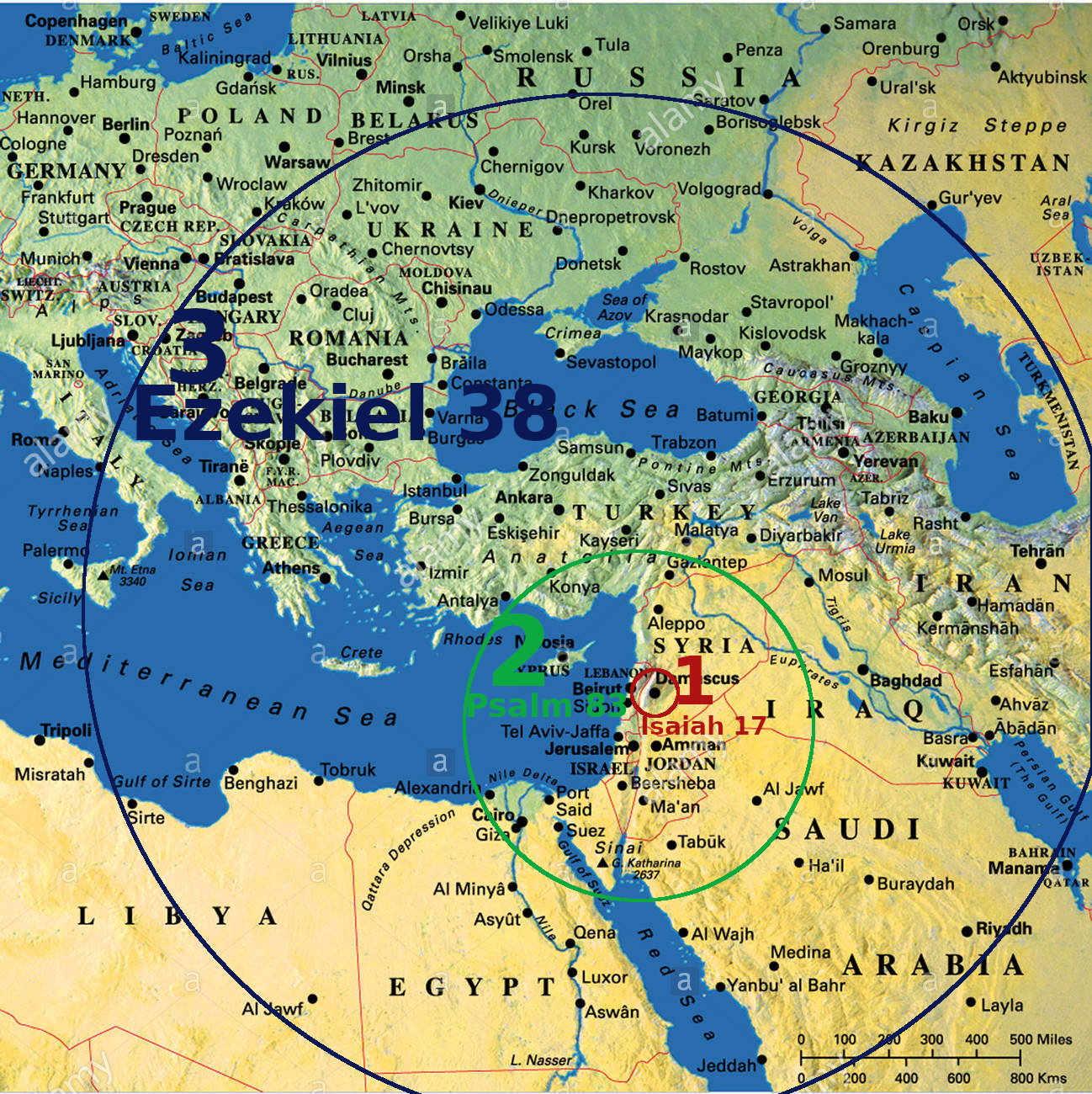
But some research has been ignored for a long time, such as pointed out here, concerning the identity of Rosh being a place rather than meaning chief
. As with names of God, Rosh
is transliterated rather than translated in the Greek Old Testament, whereas if it meant chief
the equivalent Greek word would have been used. So I lean toward it being a city name. Even so, all factors need to be considered, and it still can’t be settled between western Turkey and Russia. Either way, the invasion comes from far north of Israel.
Notice the phrase hooks in the jaws
in verse 4, as mentioned in an earlier lesson: God will turn this coalition in a direction it wasn’t planning to go. Concerning this army from nations surrounding Israel for a great distance, the weaponry and armor is described in terms of ancient warfare without qualifiying it with such as
or appeared to be
. So some jump to the conclusion that it must have been fulfilled in the distant past. However, history has shown that on more than one occasion societies have reverted back to primitive conditions. So such weapons in a future war, where electronics may no longer be functioning, is within the realm of possibility. As we’ll see next, this event takes place shortly after another war, so even if the setback is regional rather than worldwide, the scenario is possible in the future. And I disagree with Constable’s Notes that this army is Babylonian, since it’s not a city as required by descriptions in Revelation.
Now verse 7 gives the motive and setting: to plunder people gathered from many nations to the land of Israel, which has come to feel secure after war. Modern Israel has never felt secure, but after the defeat of the hostile nations all around its borders and acquiring their land and wealth, they would make a very juicy target indeed. So seizing the opportunity, the coalition will swarm to the mountains of Israel.
Verse 10 continues with the details, and notice the phrase the center of the earth
. This of course marks the land of Israel as the focal point of the world. But in the face of this impending attack, look at the weak protest of Sheba and Dedan in verse 13; that’s all they can do, they
being what is modern Saudi Arabia and the shipping centers of the region. Their concern isn’t so much the destruction of Israel as it is the destruction of their source of income. But the purpose of all this is given in verse 16: God will be honored by all the nations. No war since the time of Christ has accomplished this, so it remains to be fulfilled.
In verse 17 we’re given the outcome of the threat. First, God causes a great earthquake in Israel, so great that the whole world trembles in fear of God’s presence. Second, God causes the army of Gog to turn on itself. At the same time, God rains down plague, bloodshed, hail, fire, and brimstone. These are not presented as metaphors, any more than prior prophecies were mere metaphors, so this has not yet been fulfilled. Though it can’t be proved whether this all takes place at the start of the Tribulation or end of the Millennium, I think it’s probably the former.
Notice that the people of Israel will use the defeated army’s weapons as fuel for 7 years (see also the chart Prophecy Timeline). Here again, there’s no need to resort to force-fitting modern weapons into this prophecy. If Israel has given up its weapons, due to feeling secure and as a possible part of the covenant mentioned in Dan. 9:27, it would make an easy target for nations with even the most low-tech weaponry. But we’ll only know for sure when we see it fulfilled. The point is that Israel will plunder those who sought to plunder it.
Starting in verse 11 is the aftermath of all those deaths. There will be people employed during that time to go out and mark all the places where a dead body lies, and others will come along and bury them. Since this takes place on that day
, it remains to be fulfilled, but the question is when. It seems unlikely that such a situation as described here would take place during the second half of the Tribulation, when faithful Jews will have fled the land for the place of safety in the desert. Neither would such a graveyard be likely to exist on the new earth after the Millennium. So by process of elimination we’re left with a either before or during the first half of the Tribulation, or during the first seven years of the Millennium. But we should make note of the fact that the motives and method-of-defeat of Gog are not the same in this passage as in the only other passage about Gog, that being Rev. 20:8.
On the other hand, verse 17 is referenced in Rev. 19:17-18, which takes place at the beginning of the Millennium, and Israel turns to God as a result. Yet on the other other hand, the end of the Tribulation is a very unlikely time for there to be a Magog left to muster an army. We simply don’t know where this event fits, but we know it will be literally and physically fulfilled. And remember that one part of a prophecy can be separated from another by many years. Verse 25 turns to what is undeniably the Millennium by description.
This is a separate, later vision about the Millennial Kingdom and Temple, which may try to be built as was Herod’s Temple illustrated here. This is not to be confused with the Tribulation temple, which according to Zech. 14:2 will likely be destroyed when Jerusalem is ransacked during the Bowl judgments. The vision begins with the Millennial Temple, on the spot of Solomon’s Temple, whose location was on the Gihon River and not the present-day Dome of the Rock. There’s an excellent article here, and this is one of the images, to which I’ve added the likely locations of the Dome of the Rock and Wailing Wall.
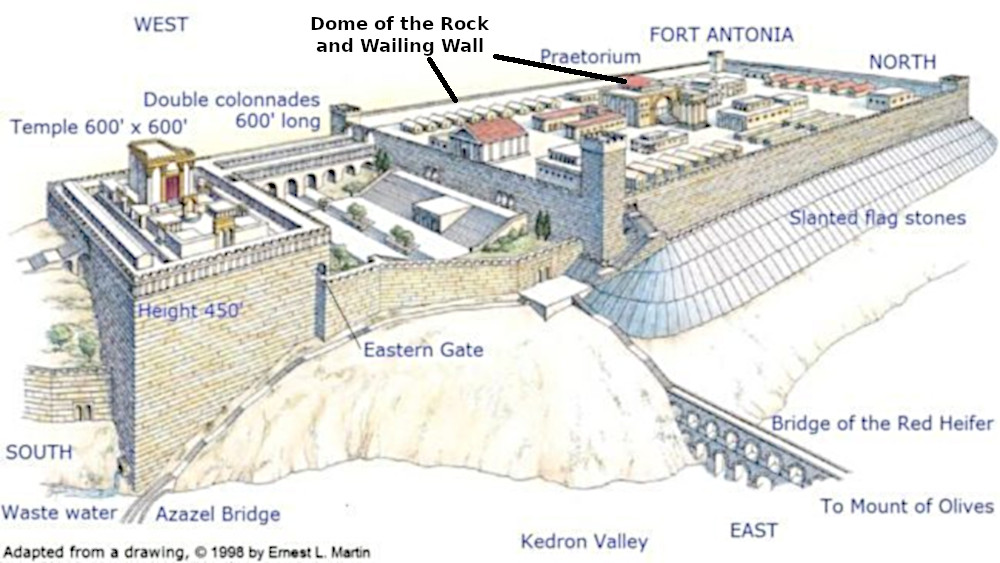
The next image is what the Millennial Temple will probably look like. The precise measurements and layout are given here, and there’s also a drawing in Constable’s Notes. This continues into chapters 41 and 42. Ch. 43 is where Ezekiel sees the glory of God again, coming from the east and filling the temple. Then after another reminder of past sins of Israel, it describes the altar itself with just as much attention to detail. But as rules for the sacrifices and rites are described starting in verse 18, beginning with a purification ritual, notice that these are not identical to those under the law of Moses. That system looked forward to the Messiah, while this one will look back as a reminder, especially for Israel. The priesthood of Zadok is connected with the reign of David, whose kingdom this will be.
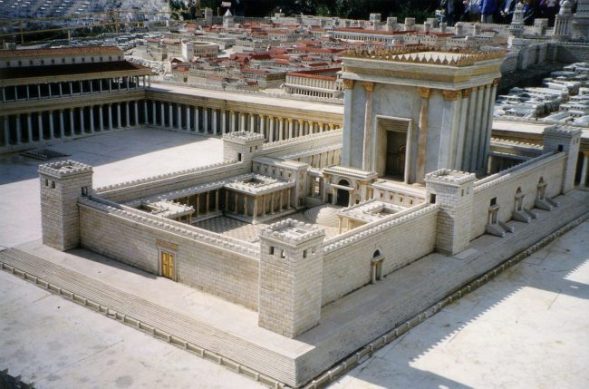
Ch. 44 begins by explaining that the gate through which God enters the santuary will remain shut forever afterward. Then it turns to another vision of God’s glory filling the temple, and another caution for Israel against ever repeating their violations of it. Then in verse 10 God states that the Levites will no longer be permitted to serve as priests, but instead will be relegated to watching over the gates, which includes managing the day-to-day business of temple activities. The exceptions will be the line of Zadok, as we see in verse 15. Following that are rules given for those priests.
Ch. 45 begins a description of a special plot of land sometimes referred to as The Sacred District. You can see more details about this at this source, which distinguishes the Sacred City in this district from both Jerusalem and the New Jerusalem.
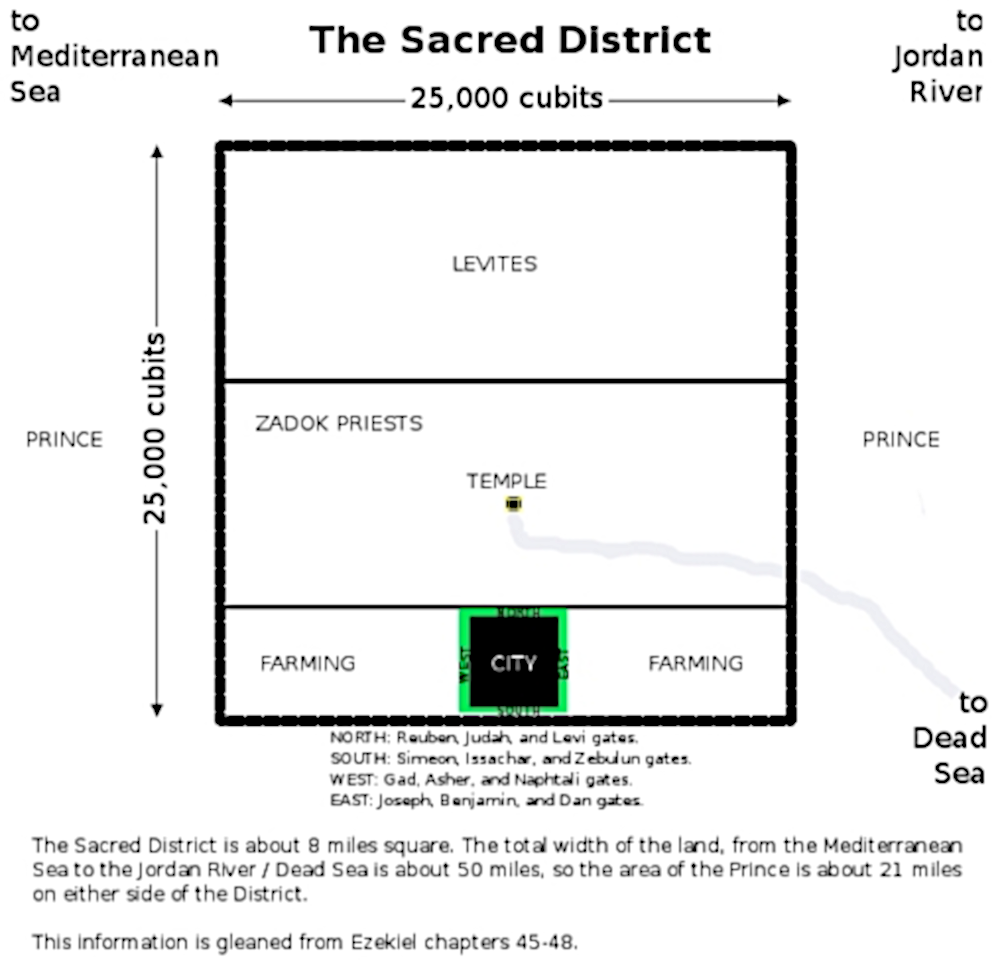
As you can see in the next image, the land is divided into places for the Levites, the priests of Zadok, the Temple, farmland, and the Sacred City. On either side of the District is land assigned to the prince
, who can’t be Jesus since he has to make atonement for his sins and cannot enter through the Lord’s Gate. It would have to be either David or a descendant, though we should keep in mind that the resurrected David will no longer be mortal, while this prince will have children during the Millennium. (If the eastern river is the Euphrates, as per the original land grant to Abraham, then of course the tribes have much more area than shown here.)
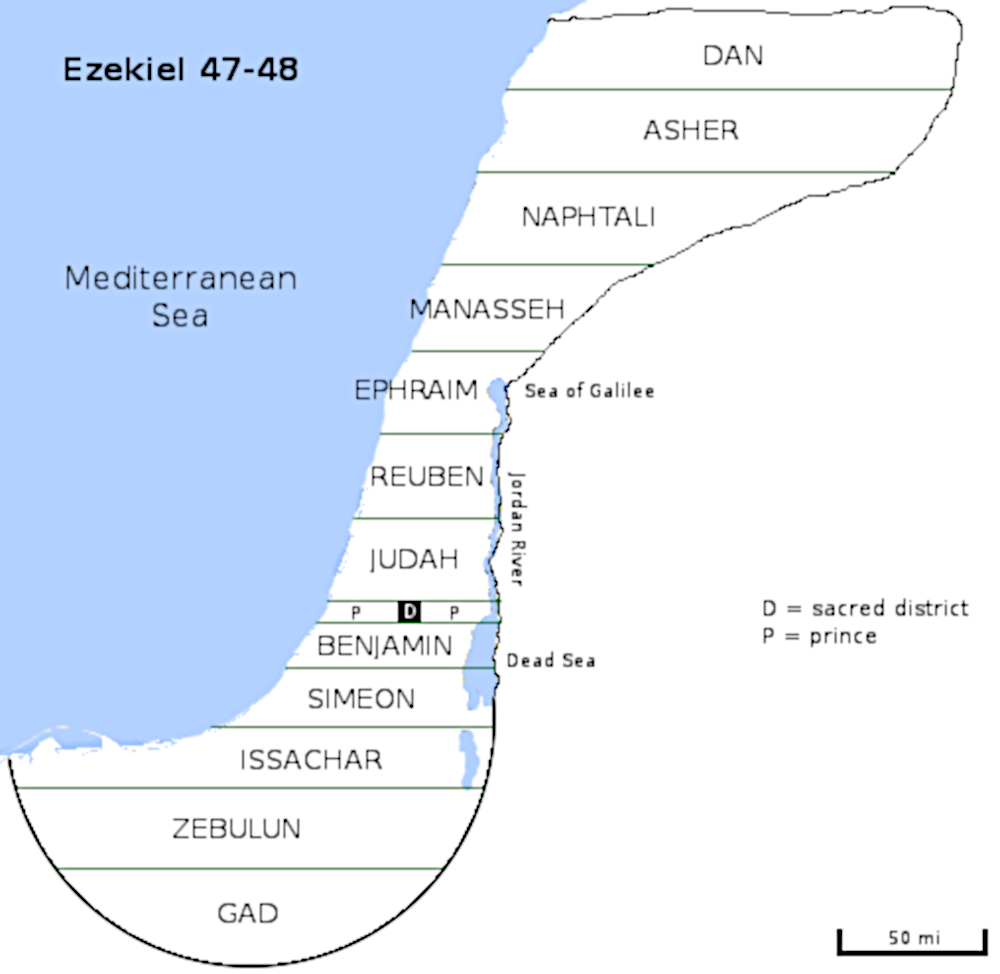
Descriptions continue into ch. 46, and then ch. 47 focuses on a strange river of water flowing from under the threshold of the temple toward the east, which is crudely represented in the drawing here. As Ezekiel follows it along, the water becomes deeper and deeper, until it’s too deep and wide to cross.
Ezekiel is told that the river empties into the Dead Sea, which becomes alive
because of its source. Notice what it says about trees on the riverbanks: Their fruit is for food and their leaves for healing, which tells us that Rev. 22:1-2 must refer to the Millennium rather than the new earth, since there will be no temple after the Millennium according to Rev. 21:22.
As for the rest of the land of Israel, it will be laid out roughly as shown here and in Constable’s Notes, according to the boundaries and landmarks as given in the text (though some put the eastern boundary at the Euphrates much farther out). Levi and Joseph are replaced by the two tribes of Manasseh and Ephraim, since Levi has land inside the Sacred District.
The details continue through the end of the book, which makes sense of a lot of things in Revelation that otherwise seem obscure.
↑ Page Top